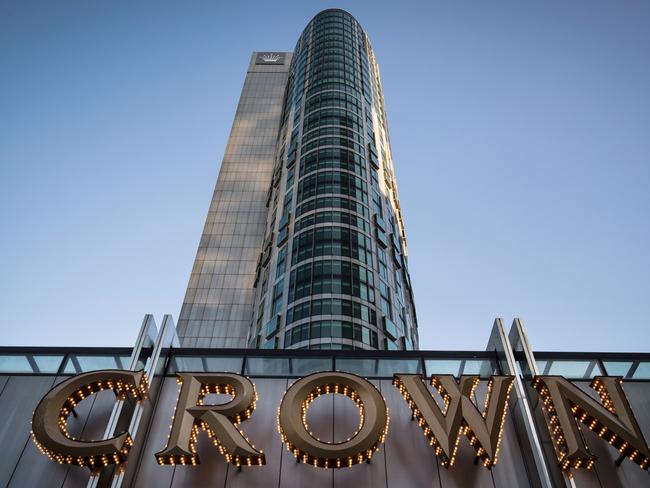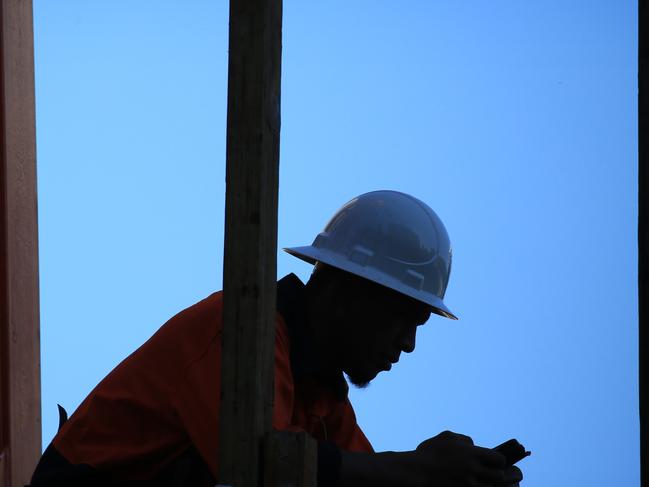High-rolling tradie gamblers seek court secrecy in tax stoush
A pair of cashed-up tradies who gambled heavily at Crown casino and at private poker games are fighting massive tax bills – but court rules mean you’re not allowed to know who they are.

National
Don't miss out on the headlines from National. Followed categories will be added to My News.
Allegedly tax-dodging tradies are seeking a shield from the Federal Court in a stoush over gambling winnings.
The cashed-up tradies, a pair of brothers from Sydney targeted by two criminal investigations, are part of an unknown number of people who have filed cases using “fake” names.
Federal Court officials have refused to release documents in the case, which is an appeal from a decision of the Administrative Appeals Tribunal that upheld the brothers’ tax bills.
But tribunal documents show that both NSW Police and the NSW Crime Commission have run criminal investigations into the brothers, who had a business that owned a single concrete pumping truck and gambled large sums at Crown Casino in Melbourne.

The Tax Office claimed the brothers “significantly understated their taxable income” between 2011 and 2016, saying they either made more than they admitted from the concrete pumping truck or “had other unidentified sources of income”, AAT deputy president Bernard McCabe said in a ruling handed down in October.
In response, the brothers, who were given the pseudonyms QQRK and WHKY, said that large amounts of cash that passed through their hands were due to prolific and successful gambling.
Older brother QQRK told the tribunal he started gambling regularly in 2001, beginning with small bets on rugby league and American basketball, before becoming a regular gambler at Crown Casino from 2010 onwards, where he played poker, baccarat, roulette and blackjack.
Between 2011 and 2016 he took several trips to Crown a year, each lasting several days.
At Crown he played against the house and against other players at the Aussie Millions poker tournament hosted by the casino, he said.
He said he also hosted high-stakes poker games at his home at least once a month “and a few times a month around Christmas time”.
“The buy-ins were anywhere between $5000 to $50,000 and players would often walk away with hundreds of thousands of dollars in winnings,” he told the AAT.
He said he hid up to $600,000 in cash at a time in bundles around his house or in a small safe, claiming to the tribunal he knew how much was there at any one time “to the dollar”.
Mr McCabe didn’t accept QQRK’s evidence, saying it had troubling inconsistencies that included denying he owned any luxury cars.
“That claim ignored his ownership of an Audi R8, the very definition of a luxury car,” Mr McCabe said in his ruling.

WHKY told the AAT he bought his first car, a one-year-old Lexus, in 2011 for $25,000 using money he won gambling.
He said he gambled at casinos around the country, with online bookies including Betfair and BetVictor and by playing poker at private games at homes around Sydney.
When travelling to Crown in Melbourne he would take as much as $20,000 in cash with him, he said.
Mr McCabe said WHKY was “an unsatisfactory witness who was given to exaggeration”.
He found the brothers had not done enough to set aside the ATO’s estimate of their income, but reduced penalties charged against WHKY.

The ability of parties to use pseudonyms in some Federal Court matters operates in addition to changes to access rules that came into force early this year often limiting access to court files, introduced without consultation with the media.
A court spokesperson was unable to say how many cases it allowed to be filed under a pseudonym but said the court had “routinely” allowed the practice in appeals from tribunals where fake names were used “across all matters, including migration matters, since 2020”.
The court publishes rules requiring migration cases, which frequently involve claims of persecution, to be filed under a pseudonym but there is no equivalent written policy covering other types of cases.
Cases filed under a pseudonym are “temporarily removed” from public view on the Comcourts website “to ensure that the names of the persons associated with a pseudonym are not inadvertently published” but are usually restored within a day, the spokesperson said.
More Coverage
Originally published as High-rolling tradie gamblers seek court secrecy in tax stoush




